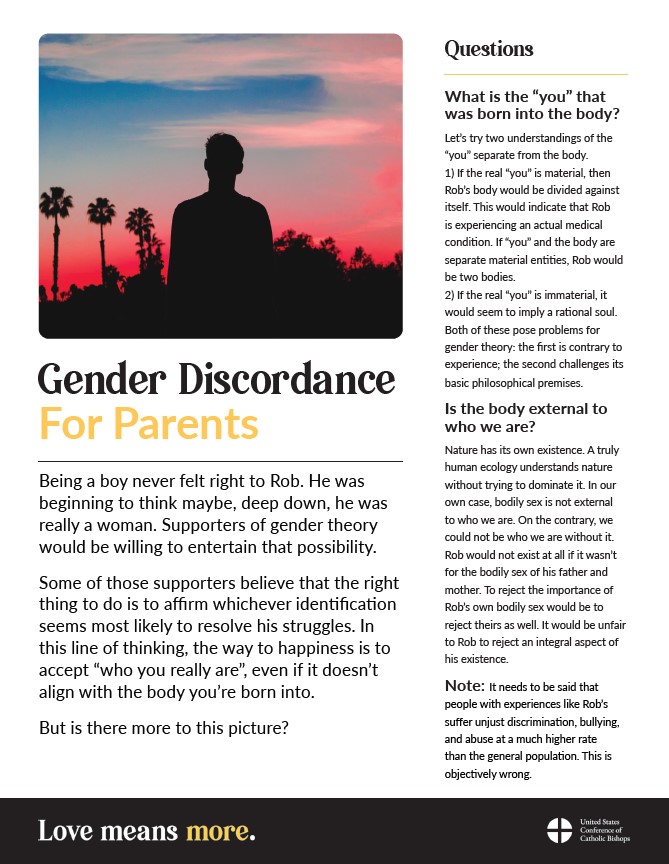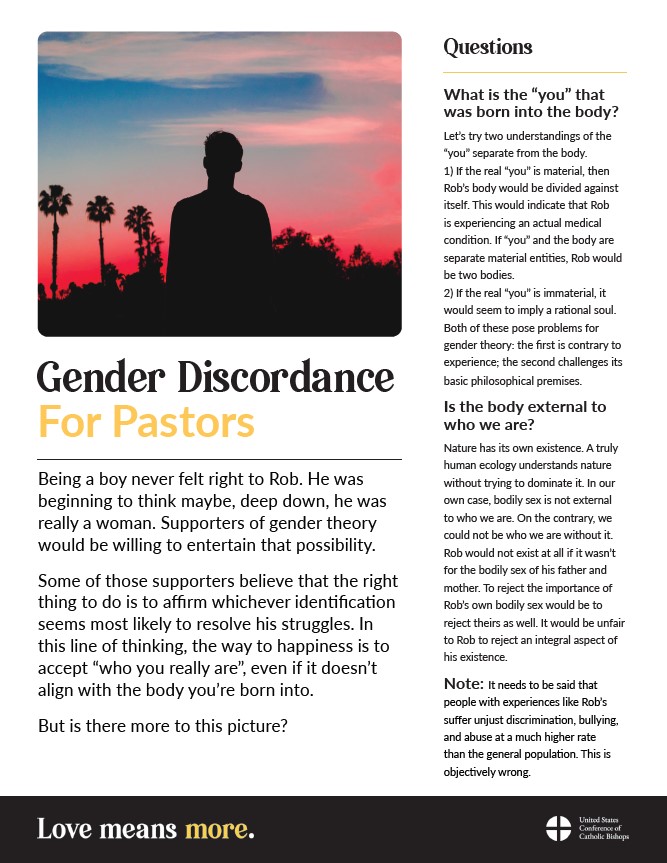Page Summary
- Phrases like “the body you’re born into” assume a faulty understanding of the body and its relationship to “you”.
- Bodily sex is inseparable from who we are, not external to who we are..
- We can affirm this while opposing unjust discrimination, bullying, and abuse directed at people who experience gender discordance.
Does someone’s internal sense of their gender determine their existence as male, female, or other?
No, but we should exercise compassion and care toward those who experience a conflict with their bodily sex.
Ok, but what does that actually mean?
Listen to this article
Being a boy never felt right to Rob. He had talked with his friend Claire about his struggles with his parents, about the boys in class who bullied him for caring more about theater than sports, and about his doctor’s unwillingness to listen seriously about his mental health struggles. Rob was beginning to think maybe, deep down, he was really a woman, even if he had been discouraged from admitting it.
Supporters of gender theory would be willing to entertain that possibility. Out of a genuine desire to ensure Rob’s physical and mental well-being, they believe that the right thing to do is affirm whichever identification seems most likely to resolve his inner difficulties. In this line of thinking, the way to happiness is to accept “who you really are”, even if it doesn’t align with the body you’re born into.


Let’s unpack this notion of “the body you’re born into” and compare it to a similar phrase, like “the clothing you don’t fit into”. In both phrases, there’s a “you” and something which might relate to you, but doesn’t define you. In the second phrase, there’s a clear difference between the clothing and you. The clothing can be removed or exchanged, and you would still be you. In the first phrase, though, what is the “you” that was born into the body? What is the “you” that would remain if the body were somehow removed or exchanged? Shouldn’t this view of what makes you happy at least be able to explain what it means by “you”?
If the real “you” is material, then Rob’s body would be divided against itself. This seems unlikely, though, since it would indicate that Rob is experiencing an actual medical condition. Also, gender theory ranks “you” above the body as if they are different in kind, so a material “you” wouldn’t really fit. If the real “you” is immaterial, that would seem to be an even bigger problem for gender theory, since its supporters rarely, if ever, acknowledge the existence of a rational soul. Even if they did, the result would be a binary in which the disembodied individual exercises absolute power over “stuff”.
There is already a version of this approach to the physical world. Human beings have imposed their will on the environment without heeding the unavoidable results. The environment is more external to “who we really are” than the human body is thought to be, but even then, there are clear signs that we can’t reshape it according to our will without far-reaching negative consequences.

The acceptance of our bodies as God’s gift is vital for welcoming and accepting the entire world as a gift from the Father and our common home, whereas thinking that we enjoy absolute power over our own bodies turns, often subtly, into thinking that we enjoy absolute power over creation. Learning to accept our body, to care for it and to respect its fullest meaning, is an essential element of any genuine human ecology.
Pope Francis, Laudato si’ 155
Nature has its own existence. A truly human ecology understands nature without trying to dominate it. In our own case, bodily sex is not external to who we are. On the contrary, we could not be who we are without it. Rob would not exist at all if it wasn’t for the bodily sex of his father and mother. To reject the importance of Rob’s own bodily sex would be to reject theirs as well. It would be unfair to Rob to reject an integral aspect of his existence.
But is it unfair to Rob to expect him not to identify as a woman?
Maybe, instead of implying that liking theater more than sports makes someone a girl, it’s more helpful to say that not everyone with that preference has to be a girl. Maybe girls are allowed to care more about sports without being considered as boys. We can acknowledge that Rob is a man without forcing him to abide by certain stereotypes.
It needs to be said that people with experiences like Rob’s suffer unjust discrimination, bullying, and abuse at a much higher rate than the general population. This is objectively wrong.
No effort, however, which attempts to reduce harm can deny the meaning of sex for the human person. To do so would be to reject a fundamental aspect of the person for the sake of another aspect, dividing a person against himself. (search keywords: trans, transgender, lgbt)

The recent proposal to advance the dignity of a person by radically eliminating sexual difference and, as a result, our understanding of man and woman, is not right. Instead of combatting wrongful interpretations of sexual difference that would diminish the fundamental importance of that difference for human dignity, such a proposal would simply eliminate it by proposing procedures and practices that make it irrelevant for a person’s development and for human relationships. But the utopia of the ‘neuter’ eliminates both human dignity in sexual distinctiveness and the personal nature of the generation of new life.
Pope Francis, Address of October 5, 2017






